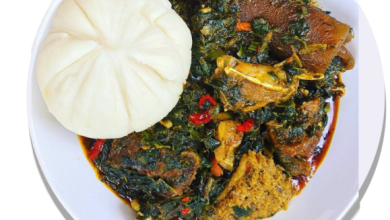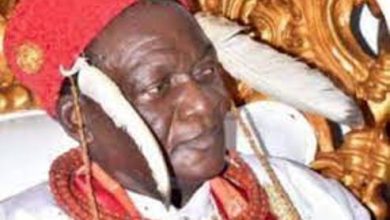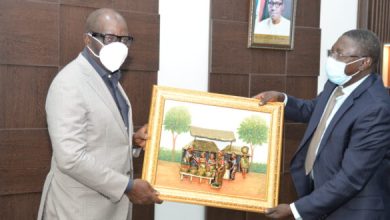Celebrating rich Eyo Festival of Lagosians
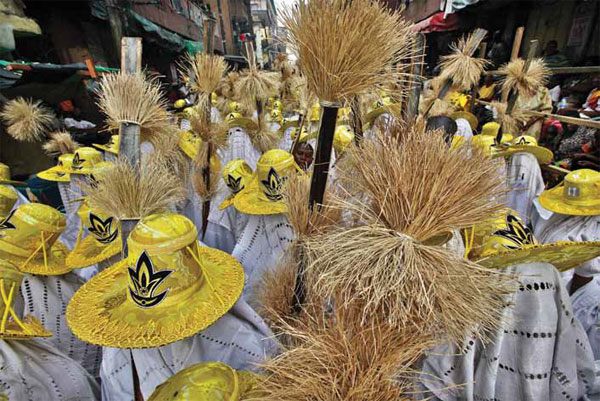
Eyo Festival, otherwise known as the Adamu Orisha Play, is a Yoruba and unique to Lagos, Nigeria. In modern times, it is presented by the people of the city as a tourist event and, due to its history, is traditionally performed on Lagos Island.
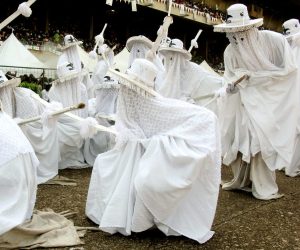
Background
Lagos is a very popular city that almost everybody hears about. The former capital city of Nigeria, and presently the commercial capital of Nigeria, is popularly called the “Centre of Excellence.” The city, called Lagos is in Lagos State, South West Nigeria. Ikeja is the state capital.
Lagos city is divided or separated by a Lagoon. Thus, it is in to two parts: the Lagos Island and the Lagos Mainland. The indigenes of Lagos are mostly domiciled in Lagos Island, known also as, Isale Eko.
It is these indigenes, who celebrate the Eyo festival, a cultural and traditional masquerade display, which emerges from the Iga (palace) of the Oba or any of his cabinet members.
The Eyo Festival
The Eyo is the masquerade that comes out only in Lagos Island. It is believed to represent the spirits of the ancestors. The Eyo festival may be held in honour of a chief or an elder of a ruling family or an Oba, who had died.
It may also be held when a new head of an Iga (palace) or a new Oba is installed. With the advent of westernization and modernization, a governor or a political leader may also request that the festival be organized to add colour to an occasion for a fee. Eyo is usually held on a Saturday.
Each Eyo comes out of an Iga (palace) of a ruling family in the morning and heads for the shrine (Agodo). It is robed from head to toe in white flowing cloth. The white flowing costume consists of an ‘agbada’ (the top robe), and the ‘aropale’ (the bottom wrap around).
No part of the person carrying the Eyo is expected to be seen. The Eyo also wears an ‘Akete’ a hat that bears the colors and shield of the Iga from which he comes. An Eyo may tie ribbons in his Iga’s colors to the Opambata (palm branch) that he carries.
Read Also: Students, staff jubilate as Gombe reopened shut-down health institutions
An Iga’s Eyo may have up to 50 to 100 or more members. Each person carrying a robe as Eyo must pay a fee for the privilege. This fee is paid to the Iga – ruling house, whose colors and Akete the Eyo wears.
Only adult males may robe as Eyo; but sometimes, there may be a child Eyo in a group. The sons and daughters and wives, as well as friends and neighbours of the Iga follow the Eyo on a parade from one end of Lagos Island to the other. The route of each Eyo goes from the Iga, where the Iga’s Eyo leave en masse, and then on to the Agodo – the shrine of the Orisa Eyo.
After this, the Eyo may go anywhere on Lagos Island their feet can carry them, all the way from Ebute Ero to Obalende, via Oke Popo, Campus, Lafiaji and all neighbourhoods the Eyo’s whims may carry him. In fact, an Eyo may easily cover 20 to 30 kilometres on that day. The crowd of supporters following the Eyo does not wear white robes
Imagine the spectacle of thousands of white robed figures in colourful hats, flowing ribbons, men women and children milling about the streets singing and dancing. The Lagos Eyo gives good meaning to the words, festival and spectacle.
The only Eyo that is not part of a group is the most senior Eyo-Adimu Orisa. This Eyo’s nose is forever running, hence, the name Adimu. Only a very old and spiritually advanced male can robe as the Adimu. It is the last Eyo to leave the “agodo.”
The Eyo, when it encounters people, greets them with the phrase, “E sunrunkunrun, we ma jagbon die!” meaning, “Don’t fear anything, have a taste of the palm tree,” and taps the individual on the shoulders with the “opambata.”
When he is given money, he will pray for the person and recite the praise song of his Iga. The phrase, “e sunrunkunrun, we ma jagbon die!” is in the Ijebu dialect of Yoruba. It was rendered as a wedding present when the Oba of Lagos married an Ijebu princess.
It is however, a taboo to either wear the Eyo costume overnight or cross any body of water, such as the Lagoon, Rivers, and so on.

Significance
The Eyo festival is organized under the auspices of the Yoruba tradition, as well as social organizations or clubs. It is an outlet used to showcase the culture of the Isale Eko people, since it can be organized for special occasions apart from the death of prominent chiefs, elders, or installation of a new Oba.
It can be used to entertain at special state functions or occasions.
Groups
· The Adimu (Orisa baba Nla Mila)
· Okanlaba Ekun (Alakete pupa), the Olopa Eyo
· Eyo Orisa Oniko (Abara yewu, egun onigemo)
· Eyo Orisa Ologede (Olugbani)
· Eyo Orisa Angere (Agere Mo Lokun)
Taboo
Items and activities prohibited at the festival are Okada (motorcycles, bicycles, sandals and smoking. Others are
*Suku – hairstyle that is popular among the Yorubas, one that has the hair converge at the middle, then shoot upward, before tipping downward.
* Female with head tie or head gear or any covering of the head
* Male with cap of any kind
The masquerades are known to beat people who use any of the prohibited items at sight with their staffs.


